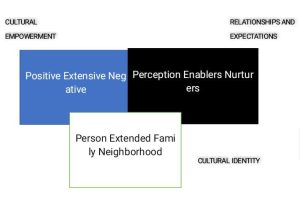Cultural Empowerment is vital in addressing health issues within specific populations. In the case of Hispanic populations and obesity, understanding and respecting their cultural beliefs and practices are crucial to promoting health effectively. This essay will explore how the three factors of the PEN-3 model—Positive, Existential, and Negative—within the dimension of cultural empowerment apply to Hispanic populations and obesity. By recognizing and leveraging these factors, healthcare professionals can design culturally appropriate interventions to empower Hispanic individuals, families, and communities toward a healthier lifestyle.
Positive Factors within the Dimension of Cultural Empowerment:
Positive factors within the dimension of cultural empowerment represent perceptions, enablers, and nurturers that promote healthy practices. In the case of Hispanic populations and obesity, various aspects contribute to positive cultural empowerment.
- Perceptions: Hispanic cultures often hold positive perceptions of physical activity, considering it a joyful and communal experience. For instance, traditional dance, such as salsa or merengue, serves as a cultural expression and a form of exercise. By incorporating and promoting these dance forms in health promotion programs, healthcare professionals can encourage Hispanics to engage in physical activity while honoring their cultural heritage.
- Enablers: Family and social support are crucial enablers within Hispanic communities. “familismo” emphasizes strong family bonds and collective responsibility for health. Leveraging this enabler, healthcare providers can involve family members in obesity prevention and management programs. Interventions can create a supportive environment that fosters healthier behaviors by emphasizing the importance of healthy eating and physical activity within the family unit.
- Nurturers: Religious and spiritual beliefs nurture health practices within Hispanic populations. Healthcare providers should respect and acknowledge the significance of these beliefs in their interventions. For example, instead of discouraging wearing religious medals or amulets, providers can work with community leaders and religious figures to educate them about healthy lifestyle choices while honoring their spiritual practices.
Existential Factors within the Dimension of Cultural Empowerment:
Existential factors within the dimension of cultural empowerment encompass unfamiliar practices that may or may not be helpful but are not harmful. Respecting these practices is essential to avoid alienating Hispanic populations and promoting culturally sensitive health interventions.
- Cultural Practices: Certain cultural practices may have limited evidence of their direct impact on obesity prevention but are essential for cultural preservation and identity. For instance, celebrating cultural holidays that involve traditional foods may contribute to weight gain. However, instead of dismissing these practices, healthcare providers can collaborate with community leaders to identify healthier alternatives or modify traditional recipes to reduce calorie content while maintaining cultural significance.
- Folk Beliefs: Folk beliefs related to obesity and weight gain, such as the idea that curvier bodies are a sign of beauty or fertility, are deeply ingrained within Hispanic cultures. While these beliefs may not align with conventional health guidelines, it is crucial to approach them with cultural sensitivity. Healthcare providers can engage in open and non-judgmental conversations to understand these beliefs, offering evidence-based information without undermining cultural identity.
Negative Factors within the Dimension of Cultural Empowerment:
Negative factors within the dimension of cultural empowerment encompass perceptions, enablers, and nurturers that lead individuals, families, or communities to follow unhealthy practices. In addressing obesity among Hispanic populations, it is crucial to effectively identify and address these negative factors.
- Unhealthy Dietary Patterns: Hispanic populations may have dietary patterns that contribute to obesity, including the consumption of high-fat and fried foods. Healthcare providers must address these harmful practices by promoting healthier alternatives and educating about portion control. They can collaborate with community leaders, nutritionists, and chefs to adapt traditional recipes, making them healthier without compromising their cultural essence.
- Sedentary Lifestyles: Sedentary behaviors, such as prolonged television viewing or limited physical activity, are prevalent among Hispanics. Negative factors associated with sedentary lifestyles must be addressed through culturally appropriate interventions. For instance, healthcare providers can organize community events that combine physical activity with cultural activities, like dance classes or sports tournaments, to promote active lifestyles while respecting Hispanic cultural values.
Conclusion to Dimension of Cultural Empowerment:
Cultural empowerment is crucial in addressing health issues such as obesity among Hispanics. By applying the PEN-3 model, healthcare professionals can design interventions that leverage positive factors, respect existential practices, and address negative ones. The positive perceptions of physical activity, enablers such as family support, and nurturers like religious beliefs contribute to the cultural empowerment of Hispanic populations. Furthermore, recognizing and respecting unfamiliar practices and folk beliefs are essential to promoting cultural sensitivity. Lastly, addressing negative factors such as unhealthy dietary patterns and sedentary lifestyles requires tailored interventions incorporating cultural values. By embracing cultural empowerment, healthcare professionals can create partnerships that facilitate lasting behavior change and promote health within Hispanic populations affected by obesity.

https://www.youtube.com/watch?v=NEb-_59Fk4Y
References for Cultural Empowerment of Hispanic Populations and Obesity: Applying the PEN-3 Model:
- Title: Cultural Competence in Healthcare: A Review of current concepts, policies, and Practices. Authors: Beach, M. C., Price, E. G., Gary, T. L., Robinson, K. A., Gozu, A., Palacio, A., … & Cooper, L. A. Journal: Policy Brief (Commonwealth Fund), 2005(832), 1-32.
- Title: Achieving cultural competence: A Guide for healthcare professionals. Authors: Campinha-Bacote, J. Journal: Jones & Bartlett Learning, 2011.
- Title: Culturally competent healthcare systems: A systematic review. Authors: Betancourt, J. R., Green, A. R., Carrillo, J. E., & Park, E. R. Journal: American Journal of Public Health, 96(12), 2169-2174, 2006.
- Title: Providing culturally competent care: A Guide for healthcare professionals. Authors: United States Department of Health and Human Services, Office of Minority Health. Retrieved from: https://www.minorityhealth.hhs.gov/omh/content.aspx?lvl=2&lvlid=53&ID=6489
- Keywords for further search: cultural competence, healthcare disparities, cultural sensitivity, patient-centered care, diversity in healthcare, multicultural healthcare, cultural awareness, cultural humility, equity in healthcare, cross-cultural communication.





